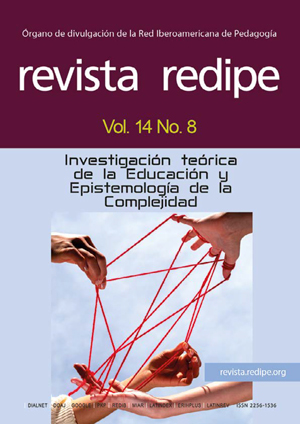Philosophical content: Indispensable and enhancing for the teaching and learning of philosophy
Main Article Content
Keywords
Philosophical content, Philosophy teaching, Philosophy learning, Critical thinking
Abstract
My goal in this essay is to show that the acquisition of philosophical content is not only necessary but decisive for the development, application, and refinement of complex philosophical skills such as critical doubt, deep and original thought, as well as the practice of philosophy in the personal and public sphere. In recent decades, the philosophical pedagogy that conceives of the student as a mere passive container of information has been strongly questioned, instead of promoting critical doubt, the development of a vital philosophical attitude, and the practice of philosophy in the personal and social realm. However, I argue that a more careful analysis of the relevance of philosophical content shows not only its indispensability but its role in the development and refinement of those skills that even critics recognize as distinctive of philosophy and philosophizing.
References
Bennasar-García, M. I., Guerrero, J. A., & Zambrano-Leal, N. Y. (2021). Pedagogía y formación docente universitaria hoy en Latinoamérica, una visión epistemológica. Praxis & Saber, 12(29), 184–200. https:// doi.org/10.19053/22160159.v12. n29.2021.11267
Castro Patarroyo, L. X., Cruz Vargas, I. D., & Ojeda Suárez, M. A. (2020). Conocimiento didáctico del contenido y enseñanza de la filosofía. Praxis & Saber, 11(27). https://doi.org/10.19053/22160159.v11. n27.2020.10613
Cerletti, A. (2008). La enseñanza de la filosofía como problema filosófico. El Zorzal.
Cerletti, A. (2023). Políticas de la enseñanza filosófica. En Filosofía y enseñanza: Miradas en Iberoamérica (pp. 327–340). Universidad Pedagógica y Tecnológica de Colombia.
Cholbi, M. (2007). Intentional learning as a model for philosophical pedagogy. Teaching Philosophy, 30(1), 35–58.
Concepción, D. W. (2004). Reading philosophy with background knowledge and metacognition. Teaching Philosophy, 27(4), 351–368.
Descartes, R. (2020). Discourse on method and meditations on first philosophy (I. Johnston, Trans.; A. Bailey, Ed. & Intro.). Broadview Press.
Díaz, L. A. M., González, Y. P. M., & Pulido Cortés, O. (2018). Educación filosófica: Entre sentidos, formas y discursos. En Filosofía y enseñanza: Miradas en Iberoamérica (pp. 123–150). Universidad Pedagógica y Tecnológica de Colombia.
Epicteto. (2024). Manual de vida (D. Hernández de la Fuente, Trad.). Arpa Editores. (Trabajo original publicado ca. 125).
Ericsson, K. A. (1999). Creative expertise as superior reproducible performance: Innovative and flexible aspects of expert performance. Psychological Inquiry, 10(4), 329–333.
Ertuna Howison, I. (2024). An argument for zinewriting in Introduction to Philosophy courses. American Association of Philosophy Teachers Studies in Pedagogy, 9, 16–27.
Espinel, O. (2020). Enseñanza y filosofía. Una mirada desde la perspectiva del aprender. Childhood & Philosophy, 16. https://doi. org/10.12957/childphilo.2020.50688
Foucault, M. (2019). Tecnologías del yo. Paidós.
Foucault, M. (2011). El gobierno de sí y de los otros: Curso del Collège de France (1982–1983) (Vol. 318). Ediciones Akal.
Gallo, S. (2018). Del enseñar filosofía como transmisión al aprender filosofía como ejercicio espiritual. En Filosofía y enseñanza: Miradas en Iberoamérica (pp. 217–238). Universidad Pedagógica y Tecnológica de Colombia.
Gettings, M. (2013). Student-centered discussions in introductory philosophy: A case study on the nature of art. Teaching Philosophy, 36(1), 55–77.
Goucha, M. (2011). La filosofía, una escuela de la libertad: Enseñanza de la filosofía y aprendizaje del filosofar; la situación actual y las perspectivas para el futuro. UNESCO.
Hadot, P. (1998). ¿Qué es la filosofía antigua? Fondo de Cultura Económica.
Hadot, P. (2009). La filosofía como forma de vida: Conversaciones con Jeannie Carlier y Arnold I. Davidson. Alpha Decay.
Ilea, R., & Janzen, M. (2024). Writing changemaking letters. American Association of Philosophy Teachers Studies in Pedagogy, 9, 7–15.



